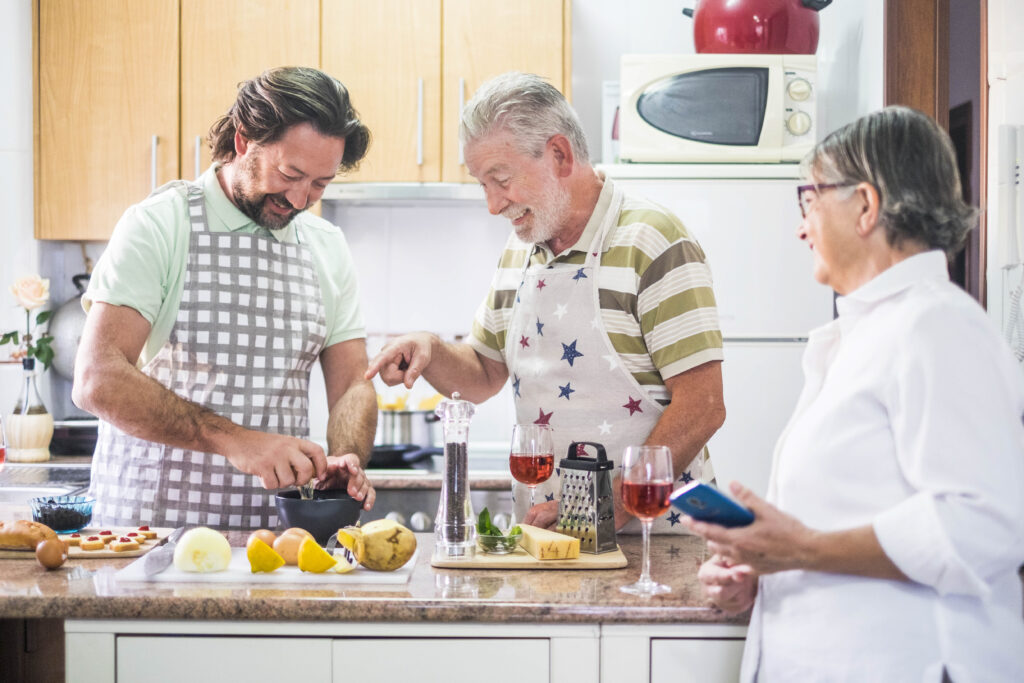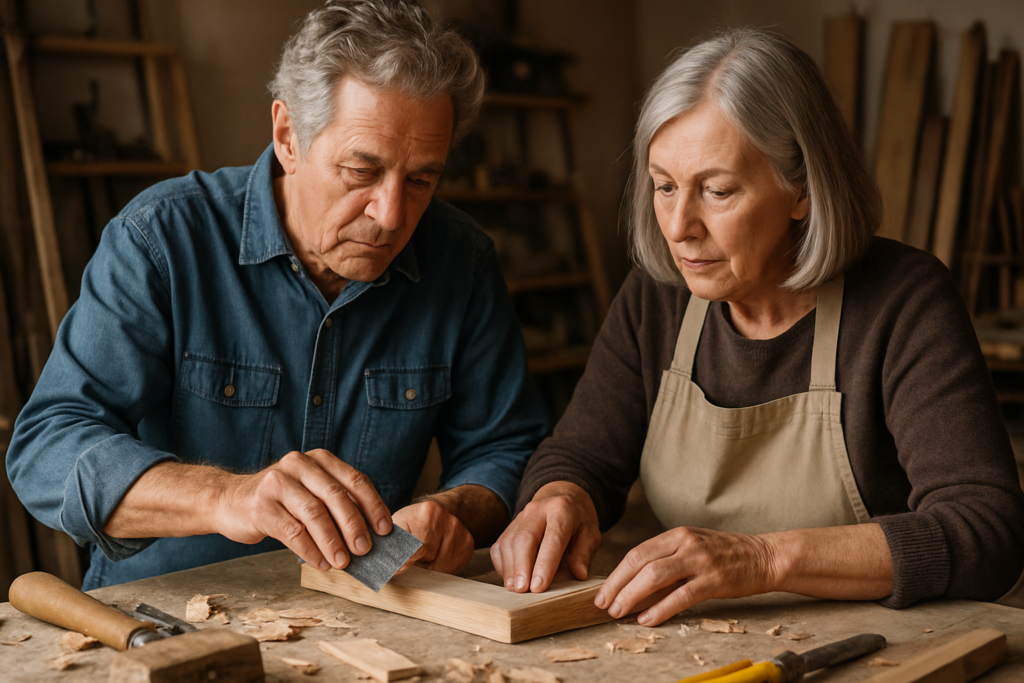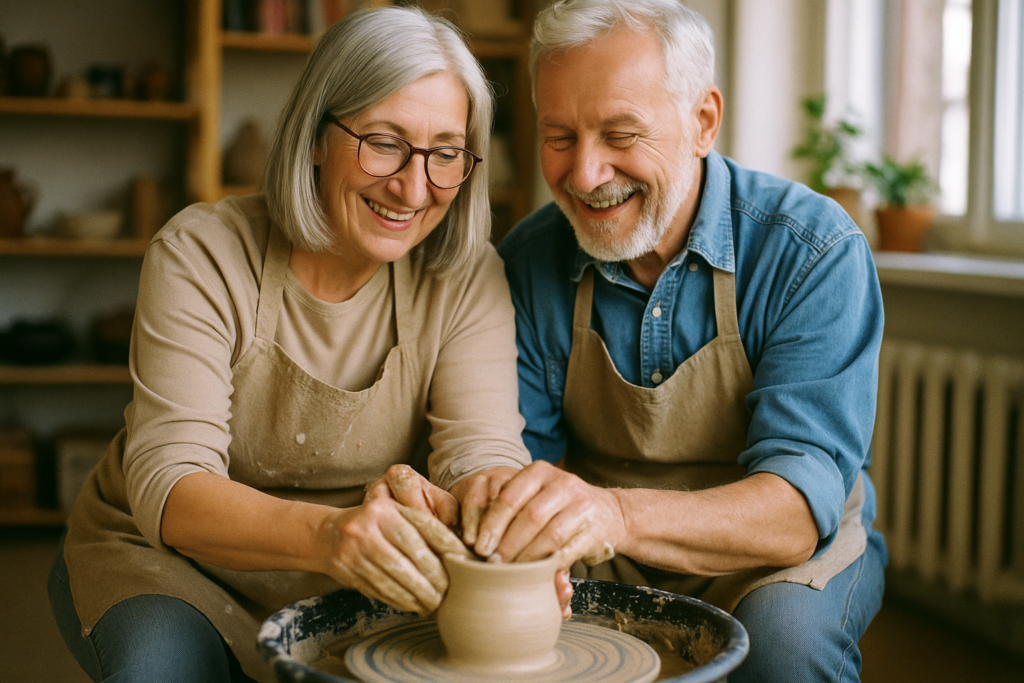Hobbies
Key Concerns
Certain hobbies such as woodworking, painting, and pottery can present both chemical and physical dangers, especially to older adults. Chemical exposure from paints, stains, adhesives, or sealants may release harmful substances like volatile organic compounds (VOCs) or even lead, especially in older materials. Prolonged exposure can irritate the lungs, cause dizziness, or contribute to long-term health issues. Repetitive motions, awkward postures, and poor ergonomics during these hobbies may also lead to musculoskeletal disorders (MSDs), causing strain in the back, shoulders, or wrists. In addition, cluttered or improperly maintained hobby spaces can increase the risk of trips and falls, which can be especially dangerous for seniors. It’s important to ensure proper ventilation, use of protective equipment, and safe workspace organization while enjoying these recreational activities.

Sources

Woodworking
When working with wood whether it involves, cutting, sanding, or finishing, you are exposing yourself to many different dangers without even realizing it. These dangers include both chemical and physical dangers. One of the main things is the dust that comes from sanding wood. This dust can be very dangerous when inhaled or cause physical harm if not cleaned up properly.

Pottery
Pottery can be a rewarding hobby, but it comes with chemical risks that are especially important for older adults to consider. Fine clay dust contains silica, which can harm the lungs if inhaled over time. Some glazes may also contain toxic metals like lead or cadmium, which pose health risks during handling or firing. To stay safe, seniors should use lead-free, food-safe glazes, wear a mask when sanding or mixing, and ensure proper ventilation when using a kiln.
How to Limit & Avoid Risks Associated with Hobbies
- Use non-toxic or low-VOC alternatives for products like paints, adhesives, finishes, and cleaners.
- Always work in well-ventilated areas and use fans or open windows to reduce inhalation risks.
- Follow all product label instructions carefully, especially for chemicals or tools.
- Wear appropriate protective gear such as gloves, masks, safety glasses, and long-sleeved clothing.
- Wash your hands thoroughly after hobby sessions to avoid ingesting harmful residues.
- When handling wood, dust, or paints, use dust masks or respirators to prevent inhaling particles.
- Use noise-canceling ear protection when working with loud tools or machines.
- Clean your workspace after every session to remove any leftover hazards like sharp objects, dust, or spills.
- Avoid bending, lifting heavy items, or prolonged kneeling during gardening or DIY repair tasks; use ergonomic tools and take frequent breaks.
- Stay alert to signs of dizziness, breathing issues, or skin irritation, and stop activity if discomfort arises.
- For older adults, hobbies involving repetitive motions or fine motor tasks (like model building or sewing) can strain joints—stretch hands, use supportive seating, and take breaks to prevent discomfort.
- Keep emergency contact numbers and a first aid kit nearby, especially when working with sharp tools or heat-producing equipment.
- If balance is a concern, avoid hobbies requiring ladders or unstable standing positions—opt for table-based tasks instead.
- Regularly inspect equipment and tools to ensure they are functioning safely and not posing hidden risks.
Frequently Asked Questions
1. Are hobbies like woodworking or painting really risky for older adults?
Yes, some hobbies can pose risks if proper precautions aren’t taken. Inhaling dust or fumes, using sharp tools, or working in poorly ventilated areas can lead to respiratory problems, skin irritation, or injuries — especially for seniors.
2. What kind of chemicals should I watch out for in craft or art projects?
Common chemicals include solvents in paints or glazes, adhesives, varnishes, and wood finishes. Some may contain VOCs (volatile organic compounds), lead, or other toxic substances.
3. How can I protect myself from inhaling harmful dust or fumes?
Work in well-ventilated areas, wear a mask (preferably an N95), and avoid sanding or spraying without protection. Use water-based or low-VOC products whenever possible.
4. Is pottery safe to do at home?
Pottery is safe with precautions. Clay dust can harm your lungs over time, and some glazes contain toxic metals. Always clean up with a wet sponge, wear a mask when handling dry materials, and choose lead-free, food-safe glazes.
5. What are some signs that a hobby may be affecting my health?
Signs include persistent coughing, headaches, dizziness, skin rashes, or joint pain. If you notice any of these symptoms, stop the activity and consult a healthcare provider.
6. What’s a good way to make my hobby space safer?
Keep your workspace organized and clutter-free, improve lighting and airflow, use ergonomic tools, and store chemicals and sharp objects safely. Always read product labels before use.
References & Helpful Articles
- https://www.atsdr.cdc.gov/emes/public/docs/How%20to%20Reduce%20Your%20Exposure%20to%20chemicals%20at%20home%20work%20and%20play%20fs.pdf
- https://www.cdc.gov/lead-prevention/prevention/jobs-hobbies-activities.html
- https://cpdonline.co.uk/health-and-safety-guides/health-and-safety-guide-for-carpenters/
- https://hi-spec.com/blogs/news/12-most-common-woodworking-hazards
- https://www.bizinsure.com/woodworking-safety-tips/
- https://yourhometeamcare.com/safety-tips-for-seniors-while-doing-physical-activities/